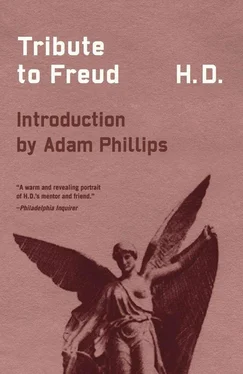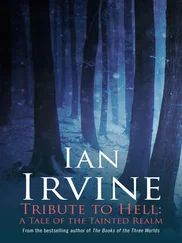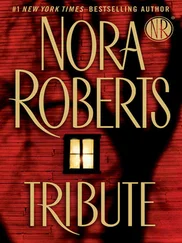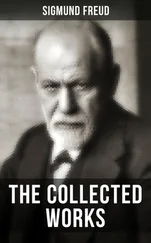She asks the question. Each verse of the lyric is a question or a series of questions. Do you know the Land? Do you know the House? Do you know the Mountain?
Kennst du den Berg und seinen Wolkensteg?
“Do you know the mountain and its cloud-bridge?” is an awkward enough translation but the idea of mountain and bridge is so very suitable to this whole translation of the Professor and our work together. Steg really means a plank; foot-bridge is the more accurate rendering. It is not a bridge for a great crowd of people, and it is a bridge flung, as it were, across the abyss, not built and hammered and constructed. There is plenty of psychoanalytic building and constructing; there are the Gods that some people read Goods. We are dealing here with the realm of fantasy and imagination, flung across the abyss, and these are a poet’s lines. The same poet’s following lines seem peculiarly appropriate to our subject:
Das Maultier sucht im Nebel seinen Weg,
“The donkey seeks his way in the mist.” There are plenty of donkeys who have set foot on the lower, more easily demarked path-ways of this mountain. Too heavily burdened with intellectual equipment or blinded with the blinkers of prejudice, they go round and round in circles and come back to the stable shaking their heads sadly over their own past folly and the greater folly of the mountain that has so beguiled them. But there are other donkeys who plod on — faithful donkeys. They find their prototype in the Christmas manger-scene.
And our very Phobia is here and the host of allied Phobias, the Dragon and its swarm of children, the Hydra-headed monster, the subject of another of the twelve labors of Hercules.
In Höhlen wohnt der Drachen alte Brut,
the old dragon-brood — or the ancient brood of the Dragon — lives in the caves. Like the Christian of the Puritan poet, John Bunyan, we must push on, through and past these perils. Kennst du ihn wohl? Do you actually know this and all these things? If anyone ever did, it is the old Professor. And it was finally St. Michael — wasn’t it? — who cast out that aboriginal old Beast? Thoth, Hermes, Mercury, and last Michael, Captain or Centurion of the hosts of heaven.
But it is with the soul rather than with saints and angels that we are concerned; Miriam or Mignon, we may call her.
Kennst du das Land, wo die Zitronen blühn?
“Do you know the land where the orange-tree blossoms?” It was on a winter day that the Professor handed me a branch from an orange-tree with dark laurel-like leaves.
Im dunkeln Laub die Gold-Orangen glühn.
Against the dark leaves is that glow of orange-gold.
Ein sanfter Wind vom blauen Himmel weht;
Yes, it was dark and cold and there was the rumbling of war-chariots from the near horizon. But upon the old Professor and this particular soul, a soft wind blew from a cloudless sky — so gentle was the wind that the myrtle, that with the rose is sacred to Love, did not flutter a leaf, and the laurel grew very tall there.
Die Myrte still und hoch der Lorbeer steht
It is all there; the lyrical interrogation and the implication that the answer is given with it. It is: do you know the Land — but you do know it, don’t you? The House? The Mountain? It is a strange land, a foreign land, a land of classic associations, the myrtle of Aphrodite and the laurel of Apollo. You do know the House, don’t you? The roof of the house stood on pillars, like the original roof or part-roof of the temple of Karnak or the Parthenon of Athens. But this house seems nearer in time; there is the great entrance room or Saal with its glowing lamps and candles, and beyond it is the brightly tapestried or painted inner room or rooms, the Gemach or apartment. It is there that we find the statues, the Marmorbilder, even as I had found the little images in the room beyond the actual consulting room, on the Professor’s table. The statues stare and stare and seem to say, what has happened to you?
Was hat man dir, du armes Kind, getan?
Poor child, poor shivering and unprotected soul. But — you do know it? — but of course you do. I want to go there with you, O my Guardian (O my Protector),
mit dir, o mein Beschützer, ziehn.
The land or country, the house, the mountain — we may rest in the garden, we may be sheltered within that house; it is so beautiful; it makes me think of the Ca d’Oro, the Golden House on the Grand Canal in Venice. It is the domus aurea of the Laurentian litany, and the whole poem in its symbolism follows the cycle of the soul’s progress. The garden, the house or hall, the mountain. The mountain is very high for it is crowned like Olympus with clouds, but there is the Wolkensteg, the cloud-bridge or foot-way. It is not a very wide bridge, the chasms or gulfs where the ancient dragon lives are deep and terrifying. (But we have tunneled very deep, said the old Professor.) Scattered rocks and ruins lie about us and the threatening roar of the cataract is still echoing in our ears. But you, of all people, know it, don’t you, the inquiring soul asks; while the plodding little donkey continues its way in the mist. O, let’s go away together, pleads the soul, the Mignon of the poet Goethe; let’s go, O my dearest, she says first,
o mein Geliebter,
then O my guardian, my protector,
o mein Beschützer,
and in the end, she does not ask if she may go; or exclaim, if only we could go; but there is the simple affirmation, with the white roses — or the still whiter gardenias, as it happened — of uttermost veneration.
Dahin! Dahin
Geht unser Weg! o Vater, lass uns ziehn!
LONDON
SEPTEMBER 19, 1944
NOVEMBER 2, 1944
March 2, 1933
I cried too hard. . went to the old wooden restaurant with the paintings, like the pictures that my mother did, Swiss scenes, mountains, chalet halfway up a hill, torrent under a bridge. As in her sequence, there were several mid-Victorian snow-scenes here, too. The old plates of the saw-mills, the Lehigh River, summer-house with trellis, deer-park of the Seminary where her father was principal for many years, suggest some near-affiliation with these weathered oils. There are a few still-life studies, apples with a brown jug and the usual bunched full double-peonies with a stalk of blue delphinium, such as we see in the Galleries, but these pictures are homely or home-y, of no intrinsic value.
My mother and I visited an Austrian village, like these pictures; it was in the early summer of 1913 after we had left Italy. My father had returned to America, he said, “to buy a pair of shoes.” There was a Passion Play; I remember my mother talking on a wooden bridge to one of the village women who said Judas was the fish-man. My mother spoke perfect German. We stayed at an inn; all I remember is the waitress calling me a backfisch and our delight in framed color-prints of the old Austrian emperor and the empress in blue décolleté with pearls. That was probably Innsbruck. The village — I don’t remember its name — took the visitors into their own homes, wooden cottages or chalets (like these in the weathered paintings), and there was a rather overwhelming feeling of the wood-carved Christ at corners of the village and at the entrance to the old bridge.
I wandered alone across the bridge but did not get far. The forest seemed menacing.
At Christmas time, we had deer on the moss under the tree. Our grandfather made us clay sheep.
I cried too hard. . I do not know what I remembered: the hurt of the cold, nun-like nurses at the time of my first London confinement, spring 1915; the shock of the Lusitania going down just before the child was still-born; fear of drowning; young men on park benches in blue hospital uniform; my father’s anti-war sentiments and his violent volte-face in 1918; my broken marriage; a short period with friends in Cornwall in 1918; my father’s telescope, my grandfather’s microscope. If I let go (I, this one drop, this one ego under the microscope-telescope of Sigmund Freud) I fear to be dissolved utterly.
Читать дальше











